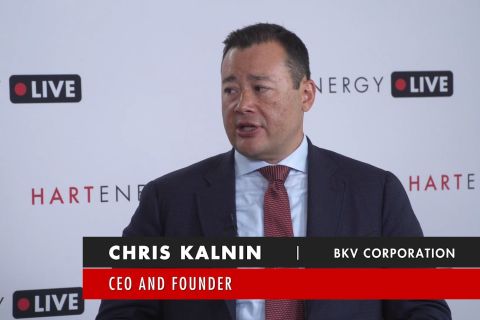Oilfield service giants Baker Hughes Inc. and Schlumberger Ltd. sent a jolt across the geophysical landscape as they agreed to merge their seismic units. Wall Street oil-service analysts expect the massive entity to give a much-needed boost to an industry segment that has been plagued by too much capacity and cutthroat competition. The deal will remove excess capacity, eliminate redundancies, allow the companies to cut costs more vigorously, and introduce more rational pricing to the industry, according to William A. Herbert of Simmons & Co. International in Houston. "We think this transaction not only has the potential to elevate returns or improve returns for both Schlumberger and Baker Hughes, but it has the potential to improve returns for the seismic industry in general," he said. "As we listened to the commentary from the companies at the time of the March quarter earnings, it was quite evident that everybody thought that consolidation was a necessary next step for the health of the industry," observed Geoff Kieburtz of Salomon Smith Barney in New York. "...This one makes the most sense in terms of the impact on consolidating the industry. You're really combining the two largest seismic contractors, and therefore you're getting the biggest bang for your buck." First Union Securities took quick action. Yves Siegel, its New York-based oil-services analyst, upgraded Baker Hughes to Strong Buy from Buy and raised his target price for the stock to $49 from $30. He views the transaction as very positive for both companies. "It creates the world's largest and, in our opinion, the technological leader in the seismic industry. We believe the company's combined market share will be greater than 40%. It should allow for significant cost savings and put both companies' businesses solidly in the black," Siegel said. Initial market reaction also was positive. Schlumberger's stock closed $2.56 higher at $73.56 the day that the venture was announced, while Baker Hughes shares rose $2.13 to $36.25. Market enthusiasm spilled over to other seismic contractors. Veritas DGC Inc. closed at $27.63, up $1.31, while Petroleum Geo Services AS rose $1.50 to $19.06. The new entity will be called Western Geco, combining the names of Baker Hughes' Western Geophysical and Schlumberger's Geco-Prakla businesses. The combined company would have had pro forma 1999 revenue of about $1.5 billion. Western Geco will be 70% owned by Schlumberger and 30% held by Baker Hughes. Gary Jones, Western Geophysical's current chief, will be Western Geco's president. Schlumberger also will pay Baker Hughes $500 million in cash. That cash, along with another $100 million in working capital reductions, would allow Baker Hughes to pay down its debt by $600 million. "They have a pretty burdened balance sheet," Herbert said. "It's a debt-to-capital ratio of close to 50%." Kieburtz placed Baker Hughes' total debt around $2.8 billion. "[The] $600 million puts a pretty good dent in that." Baker Hughes executives said there are about 40 locations around the globe in which Western Geophysical and Geco-Prakla have duplicate offices, and there is obviously much overlap, especially in back-office and administrative positions. The two companies' multiclient Gulf of Mexico data libraries have less overlap than would be expected. Geco-Prakla has emphasized the western Gulf, and Western Geophysical has focused on the central Gulf. The companies declined to comment on potential cost savings that may be realized through the joint venture, but analysts say the savings could be as high as $150 million. "Clearly there are a lot of offices and vessels and processing facilities that can be eliminated," said Marshall Adkins, Houston-based oil-services analyst for Raymond James & Associates Inc. "There's not a lot of overlap in the data library, which is good. It's a great fit." Baker Hughes and Schlumberger hope to close the transaction in the fourth quarter. Baker Hughes executives believe the key to passing the antitrust test is to make sure that vigorous competition is retained between the service companies' other business units, such as Schlumberger Wireline Services and Baker Atlas. Analysts expect more deals could follow in the wake of this blockbuster announcement. "Two of the industry's most prominent participants recognized that the way the industry stands today is untenable in terms of generating required rates of returns on their capital employed," Herbert said. "As a consequence, they've had to do something dramatic with regard to changing the structure of the industry. This is an exceedingly positive first step." -Jodi Wetuski
Recommended Reading
Exclusive: Renewables Won't Promise Affordable Security without NatGas
2024-03-25 - Greg Ebel, president and CEO of midstream company Enbridge, says renewables needs backing from natural gas to create a "nice foundation" for affordable and sustainable industrial growth, in this Hart Energy Exclusive interview.
BKV CEO: Texas Grid Needs More Combined Cycle NatGas Plants
2024-04-12 - BKV CEO Chris Kalnin dives into the "core issue" of Texas' renewable grid and how the company is increasing production as the the largest producer in the Barnett Shale, in this Hart Energy Exclusive interview.
Biden Administration Hits the Brake on New LNG Export Projects
2024-01-26 - As climate activists declare a win, the Department of Energy secretary says the pause is needed to update current policy.
Trans Mountain Pipeline Announces Delay for Technical Issues
2024-01-29 - The Canadian company says it is still working for a last listed in-service date by the end of 2Q 2024.
Tellurian Head Counters Rumors, Says Company is Focused on ‘Commercial Matters’
2024-01-29 - LNG development firm Tellurian is disputing rumors that the company is looking to sell following its hire of financial advisory firm Lazard.





